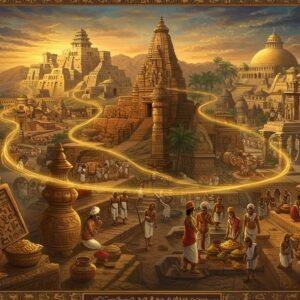
Understanding Buddhism’s journey in India offers a glimpse into the country’s rich cultural and spiritual heritage. The story of Buddhism, from its origins to its present state, reveals a fascinating tapestry of events, teachings, and influential figures.
Origins of Buddhism in India
Buddhism began with Siddhartha Gautama, the Buddha, in the 5th century BCE. His teachings, including the Four Noble Truths, which explain the nature of suffering, and the Eightfold Path, which offers a way to overcome it, form the core of Buddhist philosophy. Bodh Gaya holds immense significance as the place where the Buddha achieved enlightenment. From there, Buddhism spread throughout India, establishing monastic communities known as the Sangha.
Buddhism under Emperor Ashoka (270-232 BCE)
Emperor Ashoka’s conversion to Buddhism after the Kalinga War (circa 261 BCE) marked a turning point for the religion. He embraced non-violence and promoted the Buddha’s teachings throughout his vast empire. Ashoka commissioned the construction of numerous stupas, viharas (monasteries), and pillars inscribed with Buddhist edicts. His missionary efforts extended Buddhism’s reach beyond India, notably to Sri Lanka and other parts of Asia.
The Decline and Resurgence of Buddhism in India
Despite its initial flourishing, Buddhism gradually declined in India due to various factors, including the rise of Hinduism and later, the arrival of Islam. The Gupta Empire (4th-6th century CE), while tolerant of Buddhism, primarily supported Hinduism. However, Buddhism experienced regional revivals, notably in Bengal and Odisha during the medieval period. In more recent times, figures like Anagarika Dharmapala (19th-20th century) and Dr. B.R. Ambedkar (20th century) played crucial roles in revitalizing Buddhist thought and practice in India.
Buddhism’s Cultural and Social Influence in India
Buddhism has profoundly impacted Indian art, architecture, literature, and philosophy. The magnificent cave temples of Ajanta and Ellora stand as testaments to Buddhist artistic expression. Buddhist principles, such as non-violence (ahimsa) and compassion (karuna), became deeply integrated into Indian ethical thought. Buddhism also inspired social reforms, challenging the caste system and promoting equality.
Modern Buddhism in India
Today, Buddhism continues to thrive in India, particularly in regions like Maharashtra, Ladakh, and Sikkim. Organizations like the Maha Bodhi Society actively promote Buddhist education and pilgrimage. Buddhist festivals, such as Buddha Purnima, are celebrated with devotion across the country. The growing global interest in Buddhist meditation and mindfulness practices also resonates with many in modern India.
Poojn.in: Supporting Your Buddhist Practice
For those seeking to deepen their connection with Buddhism, poojn.in offers a wide selection of products to support your spiritual journey.
- Prayer Beads (Mala): Find traditional malas crafted from various materials to aid in your meditation practice. We offer a diverse selection, from simple wooden beads to elaborate gemstone malas, allowing you to choose the perfect one for your personal practice.
- Statues and Sculptures: Bring the serene presence of the Buddha into your home or meditation space with our collection of beautifully crafted statues and sculptures. These pieces serve as reminders of the Buddha’s teachings and inspire peaceful contemplation. Choose from a variety of sizes and materials to suit your preferences.
- Meditation Cushions and Mats: Create a comfortable and supportive environment for your meditation practice with our selection of cushions and mats. We offer a range of styles and materials to enhance your comfort and focus during meditation.
- Incense and Incense Holders: Enhance your meditation space with the calming fragrances of incense. Poojn.in offers a variety of incense sticks and holders to create a peaceful and aromatic atmosphere conducive to contemplation. Explore our selection of traditional incense burners and holders in brass, copper, and other materials.
Visit poojn.in today to explore our complete collection and enhance your spiritual journey.
FAQs
What is Buddhism’s core belief? Buddhism centers around understanding and overcoming suffering through practices like meditation and mindful living, leading to enlightenment.
How did Ashoka contribute to Buddhism? Emperor Ashoka, after the Kalinga War (circa 261 BCE), championed Buddhism, promoting its teachings and building numerous stupas and monasteries.
Where can I learn more about Buddhist practices? Explore resources like the Maha Bodhi Society and discover Buddhist centers in your area for guidance and community.


